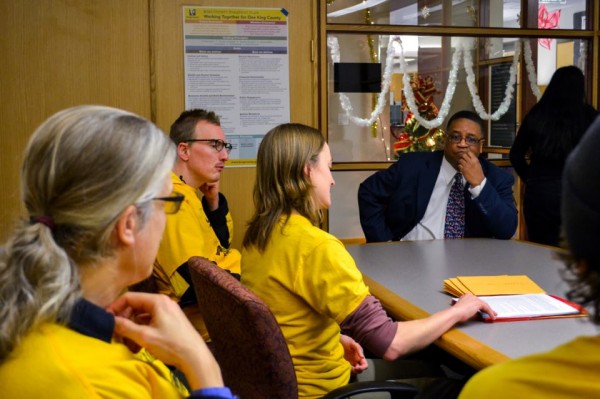On December 12, the Transit Riders Union and friends delivered a letter to the King County Council advocating for a good low income reduced fare program. This letter was signed by 28 Seattle and King County-based organizations: labor unions, community and neighborhood groups, homeless advocacy groups, political groups, faith groups, and others. What all these diverse organizations share in common is that they recognize the importance of affordable public transit for their members or constituents and for the wider community. We thank them for their support and solidarity!! (More photos here.)
Council Chair Larry Gossett met with us and received the letter on behalf of the council. As one of the councilmembers (along with Julia Patterson) who initiated the legislation calling for a committee to study the possibilities for a low income fare program, CM Gossett is supportive of our efforts and will submit our recommendations to the advisory committee, which will be forming early next year.
The letter and list of signatory organizations follow; a PDF of the final letter can be found here. Stay tuned for updates…
Dear County Councilmembers and County Executive:
We understand that you are convening an advisory committee to assist in the development of a regional low income fare program. We thank you for taking this important step toward making public transit affordable for all residents of King County. Considering the rapid fare increases and economic hardship of the past few years, and the recent closure of the Ride Free Area, there is a pressing need for a low income reduced fare. We encourage you to work to make sure that this program is adequate to the need, and that the application process is simple and dignified. We believe that, if done well, this program will be an achievement that King County can be proud of, and one that can serve as an example to the many other U.S. cities whose public transit systems and low income citizens are facing similar challenges.
To this end, we submit the following recommendations for a regional low income fare program:
- A low income reduced fare program should not replace the existing Reduced Fare Bus Ticket program, which allows health and human service agencies to purchase subsidized tickets for the people they serve. There will continue to be a need for these tickets, especially for transitory populations and since even a reduced fare will be unaffordable for individuals with no income.
- A low income fare program should be regional, ideally covering all the transit agencies that recognize the Regional Reduced Fare Permit for seniors and people with disabilities; at the least it should cover King County Metro Transit and Sound Transit.
- We recommend that a low income reduced fare match the current senior and disabled fare of $0.75. We also recommend that there be a monthly pass option.
- We recommend that an individual who is receiving some other form of income-based assistance (such as food stamps) also be eligible for the reduced fare; but we believe it is important that an income standard also be accepted, because many people who would qualify for assistance do not in fact apply for and receive it.
- We ask that whatever income standard is adopted be no lower than the standard ‘low income’ threshold of 200% of the Federal Poverty Level. We recommend that the Self-Sufficiency Standard (www.selfsufficiencystandard.org) be considered as an option, since it is sensitive to family composition and local costs of living.
- Several transit agencies have successfully used a self-certification form (honor system) rather than requiring proof of eligibility for a low income fare. We recommend that this option be considered, both because it is simple, accessible, and dignified and because the administrative savings of not having to verify and maintain records of everyone’s income or assistance would likely outweigh the cost of the very small percentage of riders who might abuse the system.
- We believe it is extremely important that it be possible to apply for a low income reduced fare card or pass throughout the year, rather than by some particular date. We also ask that people be required to renew their application no more frequently than once per year.
We recognize that a good low income reduced fare program will result in substantial costs to the transit agencies that participate in it, and that sources of funding must be found. We recommend that the King County Council petition the State Legislature for funding or a funding option specifically dedicated to such a program (for instance, a portion of a Motor Vehicle Excise Tax option). In the event that this is not possible, we recommend that a county-wide Employer Tax (RCW 81.100.030) be considered, since this is one of the few unused funding mechanisms King County already has at its disposal.
Thank you again for your work on this issue.
Sincerely,
The Transit Riders Union and:
- Casa Latina
- El Centro de la Raza
- Got Green
- International Socialist Organization–Seattle Branch
- Lutheran Volunteer Corps
- Metropolitan Democratic Club of Seattle
- Organized Workers for Labor Solidarity (OWLS)
- Puget Sound Advocates for Retirement Action (PSARA)
- Puget Sound Sage
- Real Change
- Seattle King County NAACP
- SEIU Healthcare 775NW
- SEIU 925
- Seattle Housing and Resource Effort (SHARE)
- Socialist Alternative–Seattle Branch
- Statewide Poverty Action Network
- Sustainable Ballard
- Sustainable West Seattle
- Teamsters Local 117
- Tenants Union
- UFCW 21
- Unemployment Law Project
- UNITE HERE Local 8
- Urban Sparks
- Washington Community Action Network (CAN)
- Women’s Housing Equality and Enhancement League (WHEEL)
- Youth in Focus

